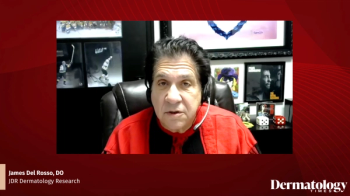
FDA Approves DaxibotulinumtoxinA for Injection for Glabellar Lines
DaxibotulinumtoxinA for Injection will provide long-lasting results with fewer injection treatments over time.
The US Food and Drug Administration (FDA) has approved Revance's daxibotulinumtoxinA (DAXXIFY) for injection for the treatment of glabellar lines. Jeffery Dover, MD, FRCPC, and dermatologist at Skin Care Physicians in Chestnut Hill, Massachusetts, discusses how DAXI differs from other facial injections, how dermatologists will change the way they treat glabellar lines, and other additional outcomes of daxibotulinumtoxinA.
Video transcript:
Jeffery Dover, MD: Hi, I'm Dr. Jeffrey Dover. I am a dermatologist in Chestnut Hill, Massachusetts at Skincare Physicians. And I'm delighted to join you.
Kaitlyn Bader, Associate Editor: Thank you so much for being here with us. So, the first thing we'd like to discuss today is how is Daxi different from other medicine or injections for facial muscle treatment?
Jeffery Dover, MD: Daxi is the first true innovation in botulinum toxins for 30 years. We've had botulinum toxin, it started with Botox, and then a few other toxins came on the market, very good products, all similar enough to Botox. They basically last 3.5 to 4 months. Done properly, beautiful results, very few side effects. Daxi is a totally new ballgame because it lasts for a mean of 6 months, and some results last as long as 9 months. So, we're going from 3.5 to 4 months, rarely pushed out to 5 months if you double up the dose at double the cost. Here's a product which is as safe as Botox and all the other neuromodulators, same side effect profile, same beautiful results, they basically last +50% longer mean of 6 months, and some results up to 9 months with no change in side effects. So, this is really a game changer. And what's really important is concerns were well if it lasts for 6 plus months, but what if the side effects last for 6 plus months? Wouldn't we be better off using our old standby or gold standards? And the answer is no. The studies which were done in 1000s of subjects in Canada and across the US in several studies over years show that the results side effects are no different than the other neuromodulators and they are not longer lasting. It's the benefit that’s longer lasting. So, it's one of these perfect balances where the results last longer, the benefits last longer. But side effects are the same if not less than other neuromodulators. And they don't last any longer.
Kaitlyn Bader, Associate Editor: How will Daxichange the way dermatologists treat for glabellar lines?
Jeffery Dover, MD: Well, I think what Daxi will do is give us a choice. Some patients will say I'm happy with what I've done, I'm happy coming in 3 times a year.It turns out that 90% of patients and 90% of doctors want a neuromodulator that lasts longer when they're surveyed. But they weren't safe and they weren't effective. So, what's going to happen? It turns out his patients don't come in 3 times a year on average, they come in 1.8 times a year. So, they're coming in less than twice a year, they're getting less than twice a year results. But they're thinking they're coming in three times a year, but they just don't. And so they're doing this: they get good results, not so good, good, not so good. It's sort of like doing your hair, you either do it or you don't. But you don't sort of dye your hair and sort of let it wear off and wait till you have 2-3 injuries. Wearing a hat at work before you change. You do it and you book as you leave in this case, instead of coming in twice a year and hoping for results that would take 3 times a year, we'll be able to get a beautiful result that lasts about on average 6 months or longer. And if a patient comes in twice a year, we'll get beautiful smoothening of the glabella and other areas like the forehead on the eyes and even other areas when they're studied, with no increased risk of side effects. So, I think what's going to happen is we're going to have happier patients with better results. One concern of my colleagues as well, my patients come in 3 times a year. And if I now have a product that I only have to do twice here, might I have empty slots in my schedule? And my answer is if you're having trouble filling your slots, there's a problem. And it's not because your problem is that you've got a toxin that doesn't last long enough. Number one, number 2, patients aren't coming in 3 times a year, we know that they come in on average 1.8 times a year or less often. So there are always other things to do. And I can assure you having done the studies with Daxi over now many years, we get beautiful, long lasting results. But the patient's desires to look good elsewhere. Don't go away. So, I don't see that as being an issue at all.
Kaitlyn Bader, Associate Editor: Thank you. And finally, are there any notable positive outcomes or even adverse effects that you want to mention?
Jeffery Dover, MD: Well, the positive outcome of Daxi is we finally have a neuromodulator, which is really breaking the mold of traditional neuromodulators, which basically last 3.5 to 4 months. Now we've got a highly effective, highly safe neuromodulator that lasts a mean of 6 months with durations up to 9 months and some people safe, effective and duration. So, this Daxi now addresses a desire and a need we haven't addressed for 30 years. And so finally we've got something new to offer our patients. And I can tell you having spoken to patients who now know about Daxi, they're lining up asking me if they can have the new neuromodulation that lasts 6 months, instead of 3 or 4 months. And so, there's a rushing sound, which is the sound of my traditional patients and new patients saying, “I understand there's a neuromodulator that's as safe as the previous toxins, but lasts 6 months or even longer.” And I think that's all good news for everybody. In terms of bad news, I don't see any downside to this, because the side effect profile has been shown to be identical, if not safer than the other neuromodulators having been studied in 1000s of individuals, the largest ever neuromodulator studies ever conducted in this country and monitored by the FDA.
Newsletter
Like what you’re reading? Subscribe to Dermatology Times for weekly updates on therapies, innovations, and real-world practice tips.










